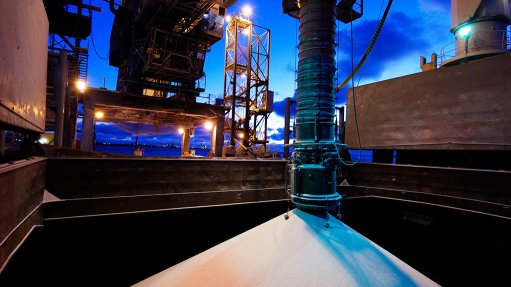
Alumina loading onto a ship for transport
BEIJING - Russia's Rusal, the world's largest aluminium producer outside China, said on Tuesday it agreed to buy 30% of the equity interest in Chinese alumina producer Hebei Wenfeng New Materials (HWNM) for 1.91-billion yuan ($261.6-million).
The deal, which is pending approvals from Chinese authorities and consent from HWNM's creditors, would allow Rusal to access alumina, a raw material to make aluminium, at a competitive cost, the Russian company said.
Russia has turned to China for sourcing alumina after Australia in March 2022 imposed an export ban on alumina and aluminium ores to Russia as part of Western-led sanctions against Moscow.
HWNM owns and operates an alumina refinery in the northern Chinese province of Hebei, with a nameplate annual capacity of 4.8 million tons of metallurgical grade calcined alumina, Rusal said in a filing to the Hong Kong stock exchange.
China exported 842 682 metric tons of alumina to Russia in 2022, 482 times more than in 2021. Its total alumina exports to Russia in 2022 were worth $413.4-million, according to China customs data.
Rusal said it and Hebei Wenfeng Industrial Group, the current owner of HWNM, would share the produced alumina in accordance with the equity interest.
Rusal would access 1.44-million tons of alumina given the share it would hold in the company, according to Reuters calculations. That would make up Rusal's about 1.4-million ton alumina shortage, according to Beijng-based consultancy Aladdiny's calculation based on data from Rusal's 2022 annual reports.
"With Rusal building its Taishet smelter, the company's demand for alumina will continue to increase in the future, so the deal can only meet its current demand, while the issue of long-term alumina supply has yet to be resolved," Aladdiny said in a note.
Rusal said earlier this year it would build an alumina plant in Russia's Baltic Sea port of Ust-Luga as it looks to reduce its reliance on imported raw materials.